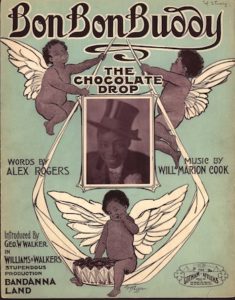
Attucks Music Co.
*On this date in 1904, the Attucks Music Publishing Company opened for business. This was one of the first Black music publishing businesses in America.
Housed at 1255 Broadway in New York City, The Company was named after Crispus Attucks, the first patriot to die in the Revolutionary War. Attucks Music's in-house writers included Tom Lemonier, Alex Rogers, William Tyers, Jesse Shipp, and Bert Williams. Some of the material illustrated is of Bert Williams and his partner George Walker. A few also featured Walker's wife, Ada Overton Walker.
Many of these lyricists had been in the music and show business for years. Tyers was formerly a staff arranger for the Joseph Stern Publishing Company. Rogers and Shipp were involved with the Williams and Walker 1902 Broadway success. Lemonier specialized in the harmonica and also performed in vaudeville. Sheppard N. Edmonds was hired to manage Attucks. While working there, Edmonds tried to get his material published under the Attucks masthead and submitted Attuck's songs to the Copyright Office under his name. This got him to be fired from Attucks.
Eventually, Edmonds formed his own publishing company, which opened in 1905, The Gotham Music Company. Other Black songwriters associated with Gotham were James Reese Europe, Tom Lemonier, and Will Marion Cook. The quick-tempered Cook was already a music business veteran and an organizing force behind Gotham Music. Gotham Publishing Company published more of his music than any other songwriter. Gotham Publishing Company was in business for over six months and published less than ten songs then.
On June 6, 1905, the Gotham-Attucks Music Company was formed by merging the two lesser firms. Staff writers included Lemonier, James `Tim' Brymn, Alex Rogers, Chris Smith, R.C. McPherson, Will Marion Cook, Henry Creamer, Bert Williams, J. Leubrie Hill, Ford Dabney, and Jesse Shipp. Some of the songs that Gotham-Attucks published came from two of Williams and Walker's Broadway Shows, “In Abyssinia” and “Bandanna Land.” In 1908, Gotham-Attucks had its most successful year, with twelve songs placed for copyright. Many of the Black songwriters moved on to other companies. Gotham-Attucks was not a large publishing company and could not put out as many versions of a particular song in different formats (voice, guitar, dance orchestration, etc.). This fact alone may have greatly influenced the writers.
One of the great accomplishments of this short-lived music publishing company was its cover art, which changed the way America saw Black written music. Until then, America had sold music supposed to portray the Black experience through hideous stereotypes. The "coon" songs portrayed everything black as bad and everything white as good. The themes of these songs revolved around chicken stealing, knife-wielding, laziness, and inappropriately dressed Black men and women.
Gotham-Attucks softened that theme in their songs and did not use blatant stereotypes on their covers. Gotham-Attucks did publish. That's why they call me Shine, a song rarely sung nowadays and known only as Shine. Yet, they made a valid attempt to free the world of these gross and powerful images. The demise of the Gotham-Attucks Publishing Company illuminates one of the darker sides of the publishing business.
In 1911, Gotham-Attucks was sold to Ferdinand E. Mierisch. After the sale, he was a song-shark who began to use the Gotham-Attucks masthead to lure in unsuspecting songwriters. Song-sharking, still in use, is how a publisher advertises for material by unknown and hopeful songwriters. When it is submitted, the songwriter is informed that his song or lyric is promising and, with a little luck, will become the next big hit.
The person is then told that a fee must be paid to have the song arranged, Copyrighted, and printed. Once the sizeable fee is paid, the publisher prints a few copies to satisfy the writer. The publisher has no further interest in the song since he makes money from the fees the unsuspecting songsters send him. With the supposedly good name of Gotham-Attucks behind him, Mierisch used the Gotham-Attucks Company in this manner for a year before he disappeared from the music business.
Music Crossroads.wordpress.com
The Library of Congress
101 Independence Ave, SE
Washington, DC 20540